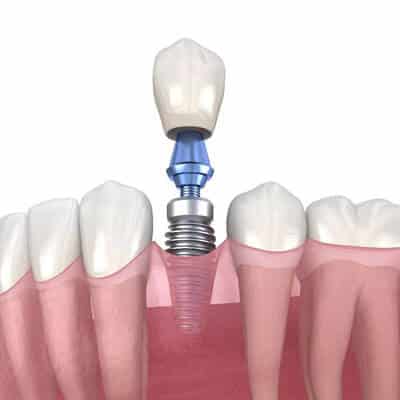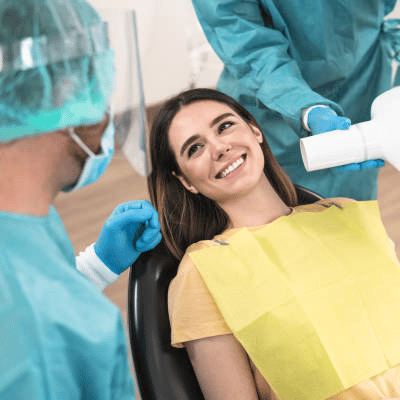Temporomandibular Joint Dysfunction Syndrome (TMJ) is a common condition affecting a wide variety of people. TMJ is characterized by severe headaches, jaw pain of varying degrees, grinding teeth, and an intermittent ringing in the ears. The vast majority of TMJ sufferers are unaware that the root cause of these problems is something that a dentist can effectively treat. As a provider with experience in treating craniofacial pain, Prairie Garden Dental is able to determine if you have TMJ disorder and can provide orthopedic treatments for the condition. With extensive training and some of the most advanced equipment in the industry, our dental team is recognized as a leading TMJ Dentist in Yorkville.

The joint that connects the lower and upper jaw – known as the temporomandibular joint (TMJ) – is one of the most complex joints in the body. Part of what makes the TMJ unusual is that, unlike any other joint, the TMJ can be affected profoundly by the positioning of your teeth. If your bite is misaligned, for instance, it can cause the TMJs to close awkwardly, possibly leading to soreness. This may be the beginning of TMD (temporomandibular joint dysfunction).
TMD is a degenerative condition and may worsen over time if no remedial action is taken. If left untreated, TMD can lead to episodic or even permanent lockjaw, as well as severe joint deterioration.
Getting Help For TMD
It’s important to take action as soon as possible if you think you may be suffering from TMD. If you live in the Yorkville area, we encourage you to make an appointment to with Prairie Garden Dental.
The critical task in treating TMD is ensuring that your bite—which is interfering with the functionality of the TMJ—is adjusted so that your jaw can open and close without stressing and irritating your joints. There are several therapies and medications available to assist in the corrective process, such as the use of splint therapy or oral appliance therapy, where the patient wears a sturdy splint, often only at night, in an effort to correct the problematic bite, and the ensuing misalignment of the jaw.
You will find products offered over-the-counter which purportedly help with TMD. These products are often fairly flexible and may be comfortable to wear. While they may temporarily relieve some of the jaw pain and headaches associated with TMD, these products don’t provide patients with the long-term adjustments that will solve the problem on a permanent basis.
The critical task in treating TMD is ensuring that your bite—which is interfering with the functionality of the TMJ—is adjusted so that your jaw can open and close without stressing and irritating your joints. There are several therapies and medications available to assist in the corrective process, such as the use of splint therapy or oral appliance therapy, where the patient wears a sturdy splint, often only at night, in an effort to correct the problematic bite, and the ensuing misalignment of the jaw.
You will find products offered over-the-counter which purportedly help with TMD. These products are often fairly flexible and may be comfortable to wear. While they may temporarily relieve some of the jaw pain and headaches associated with TMD, these products don’t provide patients with the long-term adjustments that will solve the problem on a permanent basis.
There are two main types of this disorder; central sleep apnea which occurs when the brain fails to send important signals to the breathing muscles, and obstructive sleep apnea which occurs when air cannot flow through the nose or mouth even though the body is still trying to breathe. Obstructive sleep apnea is far more prevalent and easily treatable by the dentist.
Common signs of obstructive sleep apnea can include severe early morning headaches, sleepiness in the daytime, and insomnia. Fortunately, the dentist is equipped with the necessary technology and expertise to treat sleep apnea in several different ways.
Learn More About Our Yorkville TMJ Treatment Options
If you reside in Yorkville or the surrounding area and are suffering from persistent jaw pain or soreness, headaches, migraines, or bouts of lockjaw, we encourage you to schedule an appointment for an evaluation with our team. We are able to provide non-surgical TMJ and TMD solutions in many cases.
Reasons For Treating Sleep Apnea
It is very important to seek medical attention if sleep apnea is suspected. A sufferer can completely stop breathing numerous times per hour, and this can quickly turn into a deadly situation. Obstructive sleep apnea occurs when the soft tissue lying at the back of the patient’s throat collapses into the airway. The tongue then falls towards the back of the throat which tightens the blockage and prevents oxygen from entering the lungs. The problem worsens when the chest region, diaphragm, and abdomen fight for air. The efforts they make to obtain vital oxygen only cause a further tightening of the blockage. The patient must arouse from deep sleep to tense the tongue and remove the soft tissue from the airway. Because sleep apnea causes carbon dioxide levels to skyrocket in the blood and oxygen levels to decrease, the heart has to pump harder and faster to compensate for the lack of oxygen. Sleep apnea patients can technically “die” many times each night. Sleep apnea has been linked to a series of serious heart-related conditions, and should be investigated by the dentist at the earliest opportunity.
What Does Sleep Apnea Treatment Involve?
Initially, the dentist will want to conduct tests in order to investigate, diagnose, and pinpoint a suitable treatment. The dentist can offer many different treatment options which depend largely on the exact diagnosis and the health of the patient. The dentist may advise the patient to halt some habits that aggravate sleep apnea such as smoking, alcohol consumption, and tranquilizer use.
Sleeping masks were traditionally used to keep the patient’s airways open while they slept, but nowadays there are some less intrusive options. Dental devices that gently tease the lower jaw forward are very effective in preventing the tongue from blocking the main air passage. These dental devices are gentle, easy to wear, and often help patients avoid unwanted surgeries.
A more permanent solution is to have surgery that sections the lower jaw and helps pull the bone holding the tongue forward slightly. This surgery has an impressive success rate and is simple for the dentist or oral surgeon to perform. The dentist needs to formally make a diagnosis of each individual case before recommending the best course of action.
Sleeping masks were traditionally used to keep the patient’s airways open while they slept, but nowadays there are some less intrusive options. Dental devices that gently tease the lower jaw forward are very effective in preventing the tongue from blocking the main air passage. These dental devices are gentle, easy to wear, and often help patients avoid unwanted surgeries.
A more permanent solution is to have surgery that sections the lower jaw and helps pull the bone holding the tongue forward slightly. This surgery has an impressive success rate and is simple for the dentist or oral surgeon to perform. The dentist needs to formally make a diagnosis of each individual case before recommending the best course of action.
Schedule Your Yorkville Sleep Apnea Treatment Consultation
If you feel you may benefit from our Yorkville sleep apnea treatment, contact our practice today.
Request an Appointment






